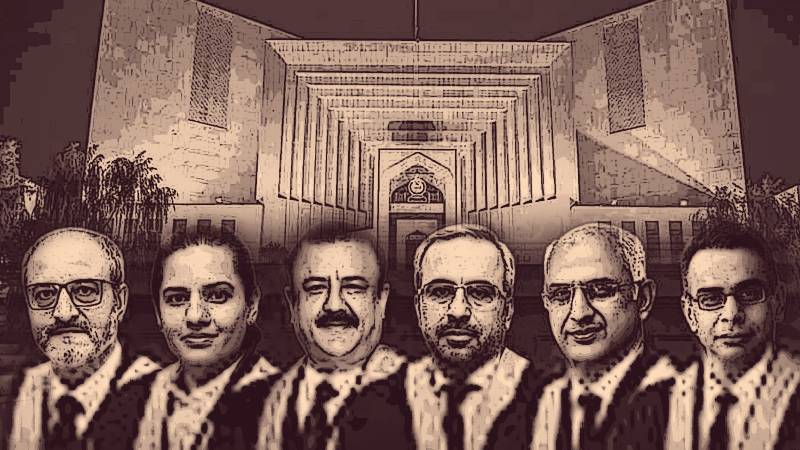
On 25th March, 6 judges of the IHC wrote to the Supreme Judicial Council to seek guidance on the issue of alleged interference by the executive branch, primarily the country’s intelligence agencies, in the functioning of the judiciary. They detailed instances where they were personally approached, sometimes through acquaintances and otherwise by way of intimidation.
“Everyone knows whatever is happening. But everyone is pretending as if nothing is happening”
Justice Athar Minallah’s remarks during the first suo moto hearing in the recent lettergate crisis perfectly encapsulates the “culture of deviance” from the rule of law that has been prevalent in Pakistan’s power corridors. Soon after the letter was made public, the judges of the Islamabad High Court (IHC) received a letter that contained powder anthrax. However, the timing of the letter and the context in which it is written may force a temporary retreat from these practices of interference.
Pakistan’s history has been marred with unfortunate attacks on the separation of powers between the legislature, judiciary and the executive. In its judgement in the recent Presidential reference, the bench of the Supreme Court, hearing the reference, conceded that the country’s former Prime Minister Zulfiqar Ali Bhutto did not receive a fair trial back in 1979 that led to him receiving a death sentence. This implies that the Supreme Court itself agreed that it was complicit in the unfair trial that the country’s first democratically elected Prime Minister received.
While it has been an open secret that this unconstitutional interference exists, the letter is a major move to bring this to light and is pivotal in initiating accountability measures against it. One must appreciate the nuance with which the letter has been written and the strategic timing of the letter that makes it even more significant. The letter comes at the time when the Supreme Court of Pakistan has vindicated Justice (retd.) Shaukat Siddique of the Islamabad High Court, who was removed by the Supreme Judicial Council back in 2018 for allegedly spreading misinformation, after he claimed in a speech that the then DG-C of ISI, General Faiz Hameed was involved in fixing court benches and indirectly impacting court decisions.
In the light of his acquittal, 6 judges of the IHC are now claiming that interference of a similar kind exists and that they “seek guidance” from the Supreme Judicial Council. It is perhaps the first time an allegation of such nature has been put forth on an institutional level. The Chief Justice and the Prime Minister were, however, quick to act and agreed on the formation of an inquiry commission, to be headed by former Chief Justice Tasadduq Jilani. To everyone’s surprise, Jilani recused himself from the commission adding to the demands of the lawyers’ community for a suo moto under Article 184(3) of the constitution. At this juncture, the case is still being heard by a 7-member bench comprising of Chief Justice Qazi Faez Isa, Justice Mansoor Ali Shah, Justice Yahya Afridi, Justice Jamal Mandokhail, Justice Athar Minallah, Justice Musarrat Hilali and Justice Naeem Akhtar Afghan. It has been hinted at by the Chief Justice and the Senior Puisne Judge Justice Mansoor Ali Shah, however, that a full court might be constituted to hear the case.
It is being argued by several journalists and political pundits that the letter may be credible, but lacks specific evidence to convict or hold any particular person accountable. It may not be of much use, especially since the establishment's hold on governance has been cemented over the course of the country's history.
However, six out of the eight judges of a very vital court coming forward will only increase calls for a transparent and democratic judicial system from the public. This letter will, therefore, go a long way in intensifying the ideological dispute that exists between the conventionalists and progressive democrats within Pakistan, perhaps weakening the former’s position on the moral high ground. Moreover, six judges coming out together adds a layer of protection for them, as their numerical strength may safeguard them from being removed from office.
Recently, Imran Khan’s sentence has also been suspended in the Toshakhana case and it is being rumoured that he may soon be given relief in the cipher case. One may allude to this letter as security, as the IHC judges clearly also mentioned one of Imran Khan’s cases where they were being asked to decide it on particular merits. Even if temporary, a retreat from the intelligence agencies may be politically beneficial for Khan and his political party.
Regardless of its consequences, the letter speaks to the yearning of millions of Pakistanis who wish to see the institutions of their state more democratic and transparent. It is now largely on the Supreme Court on how it takes this matter forward.
